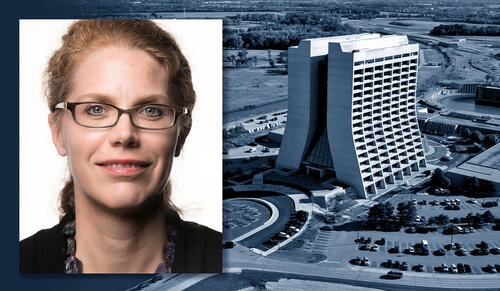
by Jim Shelton, Yale News
Bonnie Fleming, a professor of physics in Yale’s Faculty of Arts and Sciences and faculty member of Yale’s Wright Lab, has taken on a prominent new role as chief research officer and deputy director at the U.S. Department of Energy’s Fermi National Accelerator Laboratory.
Fleming, whose new position at Fermilab began Sept. 6, will also join the faculty of the University of Chicago as a professor of physics.
A Yale faculty member since 2004, Fleming’s work focuses on neutrinos, which are neutrally charged subatomic particles that pass through nearly all matter in the universe without being affected. Specifically, she studies accelerator-based neutrino oscillation and neutrino-scattering physics.
She is the founding spokesperson for the neutrino experiments MicroBooNE and ArgoNeuT — both based at Fermilab, where Fleming has conducted research since 1997 when she was a Columbia University graduate student.
At Yale, as part of her work at Wright Lab, Fleming has led pioneering research in developing the Liquid Argon Time Projection Chambers detector technology used for MicroBooNE, ArgoNeuT, and the international neutrino experiment DUNE.
“Bonnie has been a leader in the development of liquid argon detectors for neutrino physics, a technology that has enabled the recent success of the MicroBooNE experiment and that has been chosen for the international DUNE experiment,” said Karsten Heeger, professor and chair of physics and the director of Wright Lab.
“Early development work for liquid argon detectors as well as recent R&D were done at Yale and Wright Lab, in collaboration with Fermilab and Brookhaven National Laboratory,” Heeger said. “Wright Lab also constructed key detector components for MicroBooNE and the short-baseline program at Fermi National Accelerator Laboratory. DUNE will be the largest international neutrino experiment, and the scientific community is fortunate to have Bonnie serve in her new role at Fermilab.”
Heeger said Yale will continue to collaborate with Fermilab and Brookhaven on the detector development for DUNE and other neutrino experiments.
Fleming has served on several community panels in particle physics, including the 2014 P5 High Energy Physics Advisory Panel (HEPAP) subpanel. She was recently the co-chair for the U.S. Department of Energy’s Basic Research Needs on Instrumentation group and the ongoing HEPAP subpanel on international benchmarking, as well as a member of the current National Academies Decadal Survey in particle physics.
In 2006, Fleming, using part of her National Science Foundation Career grant, initiated the Girls Science Investigations, a weekend program that allows New Haven girls in grades 6 to 8 to engage in hands-on science experiments at Yale, guided by a team of volunteer mentors.
“It was a very difficult decision to leave Yale after many wonderful years, first in the high energy physics group in the Department of Physics and later in Wright Laboratory,” Fleming said. “I have treasured both these early years at Yale and later the incredible facility and community of Wright Lab. I will dearly miss my colleagues in physics and across the university, and Yale.”
